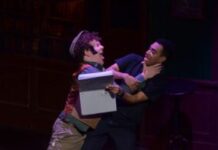I first encountered Mr. Vu at the beginning of sophomore year in my honors geometry class. I had always seen him around in the halls, but never really talked to him. As the year progressed, I got close with him through our random interactions in the hallway and in class. I loved his class and the special bonds he was able to make with each of his students. The reason I am writing this is to show the history of Mr. Vu and what a good and personable teacher he is here at Jesuit, and even encourage more students to see what a special guy he is.
What got you into all of the clubs you’ve created?
Investment club was my first year, and a couple of students needed a moderator. So, I happened to volunteer. It started off very small, but over the years lots of people got interested in it so now it is a big thing at Jesuit. The Esports Club was the same thing. I had a student that thought that having an esports team on campus would be fun since it was a big thing at the time around high schools in the country. It went somewhere, but it is dying down right now. I need some sort of team to take charge. Mr. Ornelas asked me to help with the Key Club. I have been doing it for the past four years or so and I have enjoyed leading it so far.
What do you do in each of the clubs you help run?
For the investment club, as the moderator, I help out with organizing guest speakers to come talk to the students. My role is mainly to contact the guy, find the date, reserve the theatre for the presentation, and to promote it throughout the school. When I first started for the Key Club, we would find community service opportunities. We used to go to St. Mary of Carmel Church and the club would go there every Saturday to cook breakfast such as breakfast tacos and pancakes. Gradually, after COVID, Mr. Perry and Dr. Riemer gave the club assignments and opportunities to be a part of. We did Texas Ramps, and still do. We go to a person’s home that requested a ramp be built for them. We also did Live in My Shoes. As a moderator, Mr. Ornelas and I would go and just supervise and make everything smooth. Since Key Club is a nationally recognized organization, there are dues that we have to take care of for the club. For the Esports Club, I just help organize and form teams to compete online, as well as tournaments. The past one was a Brawl Stars tournament that took place in the cafeteria during Community Time. I am not gamer enough to train the students, but I am here to promote and encourage their interests. Last year, we had a glimmer of hope when this gaming center at Brookhaven wanted us to help promote Esports to local high schools. A couple of times, I drove the short bus there and the club members hung out and took promo pics of us having fun. Eventually, it did not work because it did not gain enough publicity. I am always looking for a team that can be competitive and win things like we did some years back.

When did you start teaching at Jesuit?
I joined Jesuit the 2015-2016 year. I started off teaching one section of AP Stats and three sections of Regular Geometry. I taught On-Level Geometry for six years. Finally, last year, I taught my first year of Honors Geometry. AP Stats has grown a lot. I started with 10 kids my first year, and now it has grown to around three sections.
Did you ever think that you would be a teacher?
I went to a private, all-boys school in Boston. Never in my right mind did I think I would ever be a teacher. I went off to college and majored in Economics. At my four years there, I never had a thought about teaching besides once. When I joined my fraternity, the pledge master trained all of the new pledges and had meetings with them, etc. It was a sort of a teaching roll where you express yourself and what you like doing. That for me planted the seed that showed me that I could teach and that I was comfortable in front of a group and could “teach” them.
What did you do after you graduated from college?
After college, I worked in accounting and never thought I would teach. My whole thing was to make as much money as possible so I could live a “good life.” I was all about that and after about five or six years, it felt like I was empty inside. I did not have any good feelings about myself. I did not feel like I was doing anything worthwhile beyond earning a paycheck. I had sort of a thought, an epiphany, that if you really lack something in your life then think of a big dream that you want to accomplish. So I thought, I want to open up my own school one day. The reason why I thought that is because all throughout my life, my education was important. My family, including me, came to the United States as immigrants from Vietnam and did not know that much. We were poor, but the education that I received was all given to me. Someone would introduce my parents to new people that had very strong academics and would give me a better chance to get to one of the top high schools. People were paving the way for me and guiding me through it. I thought to myself, if I did not have those people, then I would not be who I am right now. There must be other people and other families that do not know the system as well or have the time to invest into their children’s education. That perhaps there might be a kid that is full of potential but might not reach it because he would not know any better. That initiated my thought that if I were the guy that could go out there and reach those kids, that I might be able to give them the opportunity to be somebody. That was my thought, and it stayed with me for a while and when I moved out to Dallas, I decided to go for my dream.

What did you do to actually get into teaching, and how did you end up at Jesuit?
The first step was to actually know how to teach, so I went to UTD and got certified. I did my first student teaching at Richardson High School. My supervisor there was friends with a previous faculty member at Jesuit and that is why I applied here. It was the only job that I applied to and I wanted to because it was an all boys school and I knew how it worked. Even though I applied, my initial thought was to be one of those public school teachers who went out and tried to help out the kids that were struggling. That was my passion at the time, but you just do not know where life will lead you. I got an opportunity to teach at Jesuit, so I thought of it a different way. How about I try to help and teach these well off kids about the less fortunate people and show them that when you make it, give back to your community? Jesuit as a whole fits that model to succeed, then to give back to the community. But along the way, once I did the first student-teaching class, I felt comfortable and that teaching was my calling. But now, I am kind of stuck. How would I open up my own school? Teaching was the initial step. Now, doing the work grant and being involved in a lot of the aspects of school is important to me. For example, next year I am going to be teaching freshmen football. I have never been a part of athletics, and I just want to be able to experience it since I have not before. Before work grant, I did not have any idea how the school makes money through fundraising, etc. But now, seeing that side and the behind-the-scenes of all the organizations we have is so cool to me. Everyone, including all of the parents, have a central goal. They believe in this mission of the school and try to just find a way to get it done. It is good for my development. I like being behind the scenes seeing it all, and knowing it all. I listened to a podcast and it was saying that the best philosophy in life is to have a goal that you can’t reach. Because, if you ever reach that goal, then you are satisfied and then your life becomes boring without a goal to work towards to. Maybe that is my goal, to start a school, but I do not know if I will ever reach it. Along the way, if I keep that in mind, then I will always feel motivated to do things that I would have never thought about doing anyways.

Work Grant
When I first got work grant, it used to be for people on financial aid that had to do work grant. I did not like that system and they finally did away with that. There are events and celebrations on campus and all of the sudden getting kids to clean it up does not look very great. The optics on that does not look good. Like auction, the wealthier families go and pay and bid on things. That is good for the school because it raises money for Jesuit. Then, in the middle of the night, getting the work grant kids to clean it all up kind of looks bad. I am trying my best to change the way that we view work grant here. I want it to be open to everybody. It is a “job,” so if you need one, come up here and work for me. We pay you in tuition credit. They greatest part of it all is that it alleviates and frees up people here to do other things. If there is work that is needed here at Jesuit, someone is going to have to end up doing it, it does not matter who. But, if we get students to do it, then they get tuition and the teacher or staff can free up from doing that job and can now do even more things to help out the community. Plus it allows the student to see a side of the school that they would have never seen before. It gives the students a deeper appreciation for the school. That is my main drive to make the work grant program more inclusive and lose the stigma that only the less fortunate do it.
When you do not see your philosophy to make the world a better place in action through your students, how do you deal with that to try and motivate everyone?
I give y’all students a lot more slack than I give to adults. For me, adults are hopeless, but for you, you are full of hope. You are still young and developing into the person that you are going to be. I try to be patient. What else can I do? I can only be there and remind and set an example for you, but I am not going to deter you or make you feel less because you are a kid and still trying to figure the world out.
How close are you with the other teachers?
I have good friends. I do not have any very close friends. I do not know how to describe it, but whoever I spend the most time with, I dedicate the most effort and the most of my focus to. It changes year to year. It could be someone on my team. Mr. Nava throughout my years here has been there for me and I have gotten to know him and his family over the years. I am that type of person that is like, if I am not going to see you, I probably wont stay in contact with you. But, whoever I work with the most is the person that I am closest to.
What are you involved in outside of school?
I do not go to temple or church or anything and I mostly spend time with my family. I wish that I could do more stuff like sports, but I am starting to get up there in age and I am starting to feel it. I want to be more active.

What advice do you have for your students if they are not doing well in the class, etc.?
Lots of students don’t see a purpose in a lesson or why they have to do certain things. I believe that school is a training ground to see how much students can handle. It tests the pressure they can take as well as trying to hone their stress. If they see school in this way, it will help them grow as a person here. I don’t want them to memorize the facts. I want them to grow as a person while they are here. The memorization comes and goes, but the true knowledge is knowing yourself and knowing what you are capable of. In order to do that, you need to push yourself, and when there is adversity, you push through and challenge yourself.
Tune into The Roundup for more faculty and staff interviews!






